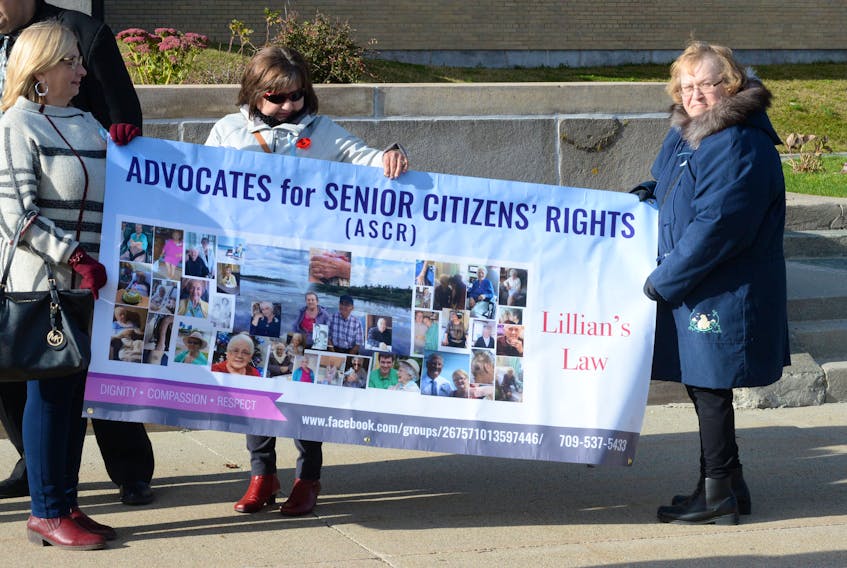Sharon Goulding-Collins has been a relentless voice for change in this province’s long-term care system ever since her mother was admitted to Lakeside Homes in Gander five years ago.
Her concerns ranged from having to push to get two baths a week for her mother — she was only getting one at first — to her mother receiving a number of injuries from falls and even being assaulted by another resident. Over the span of six months, Goulding-Collins documented about a dozen incidents.
While she blamed the home’s management and Central Health, she said the problem was a lack of sufficient staff..
“The overall number of staff hired to care for these residents, it’s not adequate. They are understaffed,” she said at the time. “Government policy, which dictates the overall number of staff, needs to (be changed so the numbers can) be increased.”
However, five years and a 9,000-signature petition later, nothing has happened.
“We need an appropriate ratio so that we have adequate care,” she said in an interview Friday.
Lobbying efforts
Goulding-Collins, who heads up a group called Advocates for Senior Citizens’ Rights, submitted a 6,500-name petition through MHAs Paul Lane and Lorraine Michael in 2018 asking for new legislation named after her mother. Lillian’s Law would enshrine, among other things, a three-to-one ratio of residents to care staff.
A larger petition was presented again this spring, but Goulding-Collins is not impressed by the reception it’s been given by Health Minister John Haggie.
“He pretty much heckled and bashed and said that Paul Lane was wasting their time,” she said.” They didn’t want to hear it, basically, and wouldn’t accept it.”
Others have spoken up about staffing levels over the years.
Suzanne Steele, whose father is at St. Patrick’s Mercy Home in St. John’s, spoke to The Telegram about the issue earlier this week.
In September 2019, she wrote a letter to the minister and others highlighting the deficiencies in care.
“It is obvious to me that the government does not understand the urgent situation our province and its seniors are in, and it appears to be worsening as time goes on,” she wrote. “One thing is clear: long term care facilities fail their residents without enough staff.
Goulding-Collins says the Canada Health Act requires Ottawa to ensure adequate standards of care across the country.
And a 61-page Royal Society of Canada report released Friday appears to echo that assessment.
Crisis situation
“Restoring Trust: COVID-19 and the Future of Long Term Care” is a peer-reviewed policy briefing prepared by a 10-person academic panel from across Canada. It focuses entirely on the need for improved staffing levels and qualifications.
“Our long-term care sector, particularly nursing homes, is in crisis now from far more than COVID-19,” the authors wrote. “The pandemic just exposed long-standing, wide-spread and pervasive deficiencies in the sector.”
Contacted Friday in Alberta, panel chair Carole Estabrooks said she’s optimistic something may finally happen on a national level, but the problems in long-term care had already been extensively studied and documented before COVID-19 came along.
“I see that families, for example, have started to say, ‘No, enough. It’s not good that our parents have been in a nursing home for three months and they’ve had no visits and that they’re dying alone,’” Estabrooks said. “Families have started to make their voices heard. So the public has to keep attention on it, but at the end of the day the politicians have to have the will.”
Old attitudes appear to be at the route of the problem, she said.
“There are long-standing, not always clearly visible, issues around our attitudes towards aging (and) the value of care-giving and the value of work that women do,” she said, pointing out 90 per cent of paid care home workers in Canada are female, as are two-thirds of residents.
“It’s a highly gendered environment, and the work in there is also gendered in that we still commonly still think of caregiving as work that women do,” she said. “It’s like domestic work, and it’s not valued.”
Estabrooks said if the will is there, some of the more important issues can be addressed fairly quickly.
“We have a lot of people in this country who can work together to make this happen,” she said. “It won’t all happen overnight, we understand that. We can fix… the immediate things right away and make sure right we’re ready for Wave 2, if it happens, of the pandemic. But we could put an action plan in place that would see really measurable changes year over year if we wanted to.
“But we have to want to.”
Peter Jackson is a Local Journalism Initiative reporter covering health care for The Telegram.
Twitter: @pjackson_nl









